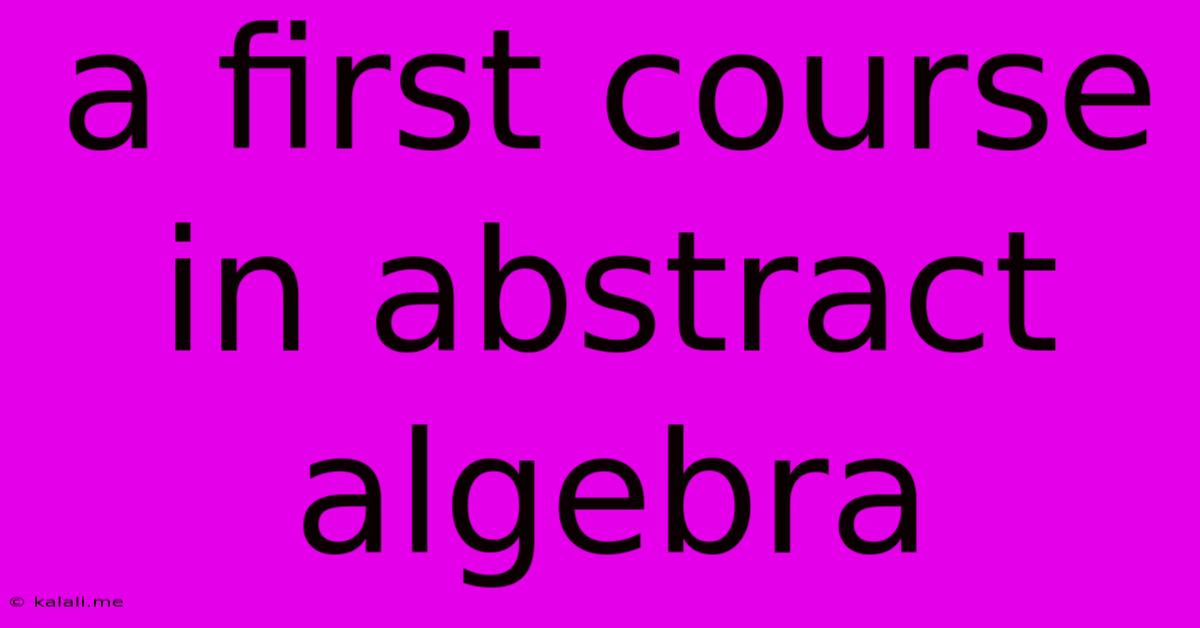A First Course In Abstract Algebra
Kalali
Jun 08, 2025 · 3 min read

Table of Contents
A First Course in Abstract Algebra: Unveiling the Beauty of Structure
Abstract algebra might sound intimidating, conjuring images of complex equations and impenetrable theorems. But at its core, it's a fascinating exploration of fundamental mathematical structures and their properties. This article serves as an introduction to the subject, providing a roadmap for those embarking on their first course in abstract algebra. Understanding the basics of groups, rings, and fields will unlock a deeper appreciation for the elegance and power of abstract mathematics.
What is Abstract Algebra?
Abstract algebra delves into the study of algebraic structures, which are sets equipped with operations that satisfy specific axioms. Instead of focusing on the specific elements of a set (like numbers), abstract algebra emphasizes the relationships between these elements as defined by the operations. This shift in perspective allows for the development of powerful theorems and techniques applicable across diverse mathematical fields. Think of it as studying the "rules of the game" rather than the individual players.
Key Concepts in a First Course:
A typical introductory course covers these core areas:
1. Group Theory: The Foundation
Group theory forms the bedrock of abstract algebra. A group is a set G along with an operation * (often denoted as multiplication or addition) that satisfies four axioms:
- Closure: For all a, b in G, a * b is in G.
- Associativity: For all a, b, c in G, (a * b) * c = a * (b * c).
- Identity: There exists an element e in G (the identity element) such that for all a in G, a * e = e * a = a.
- Inverse: For every a in G, there exists an element a⁻¹ in G (the inverse of a) such that a * a⁻¹ = a⁻¹ * a = e.
Understanding subgroups, cyclic groups, homomorphisms, and isomorphism theorems are crucial for mastering group theory. Examples include the symmetries of a square, the integers under addition, and the non-zero real numbers under multiplication.
2. Ring Theory: Expanding the Structure
Rings build upon the foundation of groups by adding a second operation. A ring is a set R with two operations, typically denoted as addition (+) and multiplication (·), satisfying several axioms, including:
- R forms an abelian group under addition (commutative group).
- Multiplication is associative.
- Distributive laws hold: a · (b + c) = a · b + a · c and (a + b) · c = a · c + b · c.
Exploring different types of rings, such as integral domains and fields, is a key part of this section. Familiar examples include the integers, polynomials, and matrices.
3. Field Theory: The Realm of Division
Fields are a special type of ring where every non-zero element has a multiplicative inverse. This allows for division, making them particularly useful in various areas of mathematics. The rational numbers, real numbers, and complex numbers are all examples of fields. Field extensions and finite fields are usually introduced in more advanced courses.
Why Study Abstract Algebra?
Beyond its intrinsic beauty, abstract algebra offers significant benefits:
- Develops logical reasoning and problem-solving skills: Proving theorems and solving abstract problems strengthens analytical abilities applicable in various fields.
- Provides a foundation for advanced mathematics: It's essential for further studies in areas like number theory, cryptography, and algebraic topology.
- Enhances computational thinking: Understanding algebraic structures helps in designing efficient algorithms and data structures.
- Offers a new perspective on mathematics: The abstract approach reveals underlying connections and structures often unseen in more concrete mathematical settings.
Resources for Further Exploration:
While this article provides a foundational overview, further exploration is encouraged. Numerous textbooks and online resources offer a deeper dive into the intricacies of abstract algebra. Remember, patience and persistence are key to mastering this subject. The journey might be challenging, but the rewards are well worth the effort. The beauty of abstract algebra lies in its ability to unveil the underlying structure and harmony within seemingly disparate mathematical concepts.
Latest Posts
Latest Posts
-
My Love For Life In Spanish
Jun 08, 2025
-
How Do You Know If You Need An Oil Change
Jun 08, 2025
-
Does The Catholic Church Believe In Evolution
Jun 08, 2025
-
Alternative To Parchment Paper For Baking
Jun 08, 2025
-
Propane Heater Wont Stay Lit After Releasing Button
Jun 08, 2025
Related Post
Thank you for visiting our website which covers about A First Course In Abstract Algebra . We hope the information provided has been useful to you. Feel free to contact us if you have any questions or need further assistance. See you next time and don't miss to bookmark.